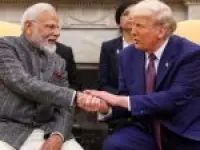
(Image: twitter.com/PMOIndia)
“India will be a developed nation by 2047, as the country celebrates its 100th anniversary of Independence. And, by that time the country will have no room for corruption, casteism and communalism,” said Prime Minister Narendra Modi on Sunday. Mr Modi was speaking to the news agency PTI (Press Trust of India).
He had covered various topics including G-20 Presidency, technology, international relations, Russia-Ukraine war, climate issues, financial and economical upbringings, developmental tools, media and news, and cybersecurity in his interview with PTI.
Here’s what he said on various topics:
India on the path of development
- India will be in the top three economies of the world in the near future.
- India will be a developed nation by 2047, corruption, casteism and communalism will have no place in national lives.
- International community is convinced India”s progress not an accident, it”s the result of action-oriented roadmap.
- India”s pitch for global biofuels alliance aimed at creating options for developing countries to advance their energy transition.
- Our domestic approach to address the most backward and neglected people is also guiding us at global level.
- Once seen simply as a large market, India now part of solutions to global challenges.
- Political stability of 9 years led to several reforms and growth is its natural by-product.
- Indians today have great chance to lay foundation for growth that will be remembered for next thousand years.
- For long India seen as country of 1 billion hungry stomachs, now it is 1 billion aspirational minds, 2 billion skilled hands.
- GDP-centric view of world now changing to human-centric one; India playing role of catalyst.
On India”s G-20 Presidency
- Whether as G20 President or not, we will support every effort to ensure peace across the world.
- Many positive impacts are coming out of India”s G20 Presidency, some are very close to my heart.
- G20 ministerial decisions taken across all domains will prove to be “pivotal” for world”s future.
- We will continue constructive contribution well past our G20 Presidency.
- The predecessors [previous governments] lacked confidence in people of other states to successfully execute high profile global meets outside Delhi.
- Over 1.5 crore Indians involved in year-long G20 programmes.
- Africa is a top priority for us in G20; no future plan of earth can succeed without all voices being heard.
- He dismisses the objections of Pakistan and China for holding G20 meets in Kashmir and Arunachal Pradesh, says it”s natural to hold meetings in every part of the country.
- Theme of India”s G20 Presidency “Vasudhaiva Kutumbakam” not just slogan but comprehensive philosophy derived from our cultural ethos.
- India”s G20 Presidency also sowed seeds of confidence in countries of so-called third world.
- Inflation key issue faced by world, our G20 Presidency led to recognition that anti-inflation policies in one country do not harm others. Timely, clear communication of policy stances key to fighting global inflation.
- In G20, our words and vision are seen by world as roadmap for future and not merely ideas.
Read More
- G20 Leaders Will Ask Questions, PM Modi Should Come Clean: Rahul Gandhi On New Adani Investigation
- G20 Summit: Justin Trudeau To Travel To India On September 9
- President Biden, China’s Xi To Be At G20; ITC Maurya, Taj, Shangri-La To Host World Leaders
- Delhi Is All Set To Receive G 20 Guests: Arvind Kejriwal
- Western Countries Hijack G-20 Agenda, Says Russia
On News and Media
- Fake news and deepfakes can cause chaos and loss of credibility of news sources can be used to fuel social unrest.
On Technology
- Terrorist using darknet, metaverse and cryptocurrency platforms to fulfill their nefarious aims can have implications for the social fabric of nations.
- India is making technology an agent of equality and inclusion.
- The country strongly supports democratisation of technology, our policies are stepping stones for a larger global movement
- Cyber threats must be taken very seriously; cyber terrorism, online radicalisation, and money laundering are just the tip of the iceberg.
- Cyberspace has introduced an entirely new dimension to battle against illicit financial activities and terrorism.
- Global cooperation in fighting cyber crimes is not just desirable but inevitable.
- There is a need to achieve a comprehensive international convention on countering the use of Information and Communication Technologies (ICT”s) for criminal purposes.
On International Relations and Institutions
- International institutions need to recognise changing realities, relook at their priorities and ensure representation of voices,
- UN must be reformed, mid-20th century approach cannot serve the world in 21st century.
- On Russia-Ukraine war, Dialogue and diplomacy only way to resolve different conflicts in different regions.
On Climate Change
- There are no one-size-fits-all solutions in fighting climate change. The approach should not be restrictive but constructive; shouldn”t focus on “don”t do this or that”.
On Economics
- Debt crisis a matter of grave concern for world, especially developing world.
- Multilateral convention on taxation will allow countries, jurisdictions to move forward with historic reforms in int”l tax system.
- Poorest and most vulnerable suffer the most from irresponsible financial policies and populism.
- Irresponsible financial policies, populism may give short term political results but extract great social, economic price in long term.













